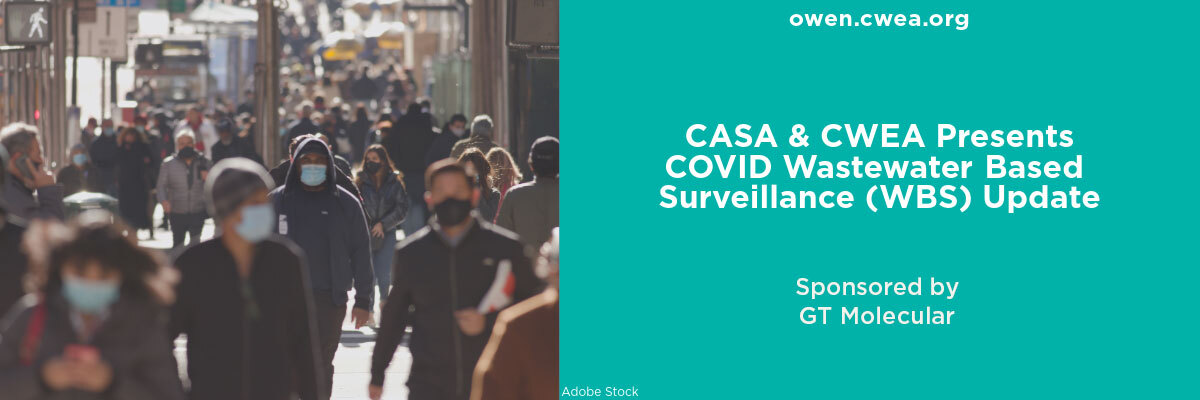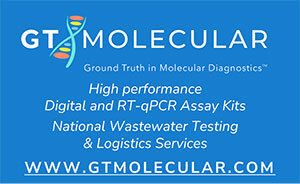
CASA and CWEA Presents: Post COVID Wastewater-Based Surveillance (WBS) Update - On Demand
Recorded On: 04/02/2024
-
You must log in to register
- Non-member - Free!
- Member - Free!

Free for Members & Non-Members
Contact Hours: 1.8 contact hours towards CWEA certifications: ALL
The California Department of Public Health (CDPH) has become a State Center of Excellence (CoE) for WBS as recognized and funded by CDC. CASA, Stanford, Emory, and SFPUC are all partners with CDPH in this endeavor as we look at continued surveillance for COVID variants, and other pathogenic organisms which may be in wastewater. Speakers will include Amy Kirby (CDC) to provide an overview of the National Wastewater Surveillance System (NWSS) ; priorities for implementation and plans for the future; Angela Rabe of the CDPH team to provide an update on their efforts in California and of the CoE; Ali Boehm (Stanford) to provide an update on academic advances in WBS; and Naoko Munakata (LACSD) will provide the utility perspective on continued use of WBS.
SPONSORED BY

SPEAKERS AND ORGANIZATIONS
Greg Kester, CASA, moderator
Dr. Amy Kirby – CDC
Dr. Alexandria Boehm – Stanford University
Angela Rabe - California Department of Public Health
Dr. Naoko Munakata – Los Angeles County Sanitation Districts
Moderated by Greg Kester – California Association of Sanitation Agencies
Greg Kester (Moderator)
Director of Renewable Resource Programs
California Association of Sanitation Agencies
Greg serves as both the technical and programmatic contact for CASA members and conduit for emerging issues on state and federal level on all biosolids, renewable energy, recycled water, and related issues. Prior to joining CASA, Greg served as the state biosolids coordinator for the Wisconsin Department of Natural Resources. He represented all states in the nation, by their election, to USEPA on all biosolids issues. He served on the National Academy of Sciences Committee which evaluated federal biosolids regulations and produced the 2002 report: Biosolids Applied to Land: Advancing Standards and Practices. Greg holds a BS in Civil and Environmental Engineering from the University of Wisconsin - Madison and is a registered PE in Wisconsin.
Amy E. Kirby, PhD MPH
Environmental Microbiologist, National Wastewater Surveillance System Lead, Community Interventions and Critical Populations Task Force, COVID-19 Response,
Centers for Disease Control and Prevention
Dr. Amy Kirby is an Environmental Microbiologist in the Waterborne Disease Prevention Branch at the Centers for Disease Control and Prevention (CDC). She has a Bachelor's of Science in Agriculture (BSA, major: Microbiology) from the University of Georgia, a PhD in Microbiology from the University of Buffalo, and a Master's of Public Health in Epidemiology from Emory University. At CDC, Dr. Kirby studies antibiotic resistant (AR) bacteria in natural and man-made water systems. She uses a combination of traditional culture-based methods and advanced molecular methods to assess the prevalence and dynamics of AR bacteria and AR genes in drinking water, wastewater, and recreational water, such as oceans, lakes, and pools. She is currently deployed to the COVID-19 response as part of the Community Mitigation Task Force, Water, Sanitation and Hygiene Team.
Alexandria Boehm
Professor of Environmental Engineering and Senior Fellow at Woods Institute of the Environment
Stanford University
Alexandria Boehm is a professor of environmental engineering and senior fellow at Woods Institute of the Environment at Stanford University. She is an associate editor at Environmental Science & Technology and Environmental Science & Technology Letters. She has over 20 years of experience studying sources, fate, and transport of pathogens in natural and engineered systems. Since the start of the pandemic, she has been working with other academics as well as wastewater and public health stakeholders on science and implementation of wastewater-based epidemiology for disease surveillance.
Naoko Munakata
Supervising Engineer
Los Angeles County Sanitation Districts
Naoko Munakata is a supervising engineer in the Wastewater Research Section at the Los Angeles County Sanitation Districts. Her current and past research projects include work on odor control, food waste co-digestion, composting, and advanced treatment of recycled water, including innovative disinfection methods, advanced oxidation processes, and salt management technologies. Naoko holds a B.S. degree in chemical engineering from MIT, M.S. and Ph.D. degrees in environmental engineering and science from Stanford University, and is a licensed Civil Engineer in California. She is a member of the Water Environment Federation and the California Water Environment Association, is a past chair of the WEF Disinfection and Public Health Committee, and currently serves as the vice-chair of the Utilities Community of Practice for the Center for Disease Control’s National Wastewater Surveillance System.
Angela Rabe
Coordinator, California Center of Excellence National Wastewater Surveillance System (NWSS)
California Department of Public Health Division of Communicable Disease Control Surveillance Section, Coronavirus Science Branch
Angela Rabe is a Wastewater Epidemiologist and now the NWSS Center of Excellence Coordinator for the California Department of Public Health (CDPH). She has been working on wastewater surveillance as part of CDPH and the COVID-19 pandemic response since late 2020. Angela received her master’s degree from the Scripps Institution of Oceanography where she studied climate change related impacts on water and energy along the CA-Mexico border. Angela has previous experience in water quality and toxicology as a research assistant at the Hyperion Water Reclamation Facility, and environmental equity and justice as a scientist and the Assistant Tribal Liaison for the CA State Water Resources Control Board. Currently, she and the CDPH Surveillance of Wastewater Systems (CalSuWers) team are working with partners at sanitation districts and local health departments around CA to monitoring wastewater as an enhanced surveillance method for SARS-CoV-2, Influenza, RSV and mpox, among other pathogens.
Registrants who view the live webinar to see the slides and hear the audio and then enter the correct attention check codes (directions below) will receive 1.8 contact hours towards CWEA certifications: ALL
To receive your contact hours for viewing the live webinar, please note the two (2) different attention check codes that will be displayed at two different points during the webinar in the top right corner of the presentation for approximately 90 seconds. Please enter these codes as 1st attention check code – 2nd attention check code (XXXX-XXXX) in the Attention Check Code component under the "Contents" tab.
Please note, all user activity of CWEA certification holders on the Online Wastewater Education Network is subject to the CWEA Code of Ethics standards for professional conduct and ethics. Certification holders should receive credit for a training only once within the same contact hour period. Any attempt to undermine the certification process may be subject to ethics procedures and possible sanctions. It is not possible to receive contact hours for both attending the live webinar and viewing the recording.
Once you have entered the correct attendance check codes, you will be able to create and download an electronic certificate of completion under the "Contents" tab.

